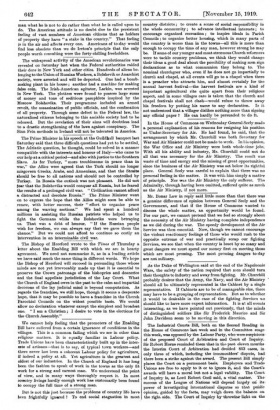The Prime Minister in his speech at the Guildhall banquet
last Saturday said that three difficult questions had yet to be settled. The Adriatic question, he thought, could be solved in a manner compatible with the interests and honour of Italy—who came to our help at a critical period—and also with justice to the Southern Slays. As for Turkey, "more troublesome in peace than in war," the Allies were agreed that the Turk should no longer misgovern Greeks, Arabs, and Armenians, and that the Straits should be free to all nations and should not be controlled by Turkey. In Russia the outlook was not pleasant. He did not fear that the Bolsheviks would conquer all Russia, but he feared the results of a prolonged civil war. "Civilization cannot afford a distracted and desolate Russia." The Prime Minister went on to express the hope that the Allies might soon be able to renew, with better success, their "effort to organize peace among the warring sections." We had spent a hundred millions in assisting the Russian patriots who helped us to fight the Germans while the Bolsheviks were betraying us. That was a debt of honour. "If the Russian people wish for freedom, we can always say that we gave them the chance." But we could not afford to continue so costly an intervention in an interminable civil war.






































 Previous page
Previous page